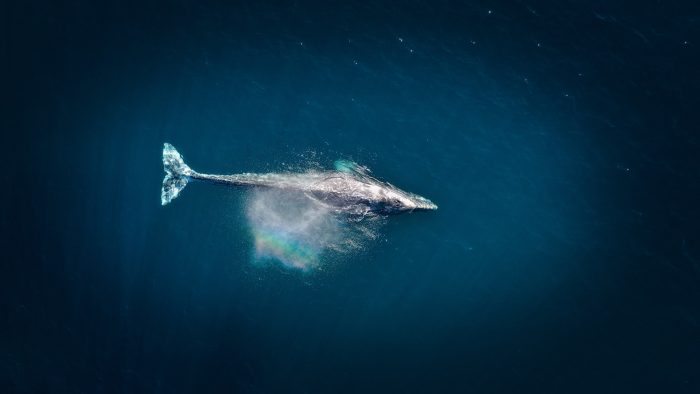It started with an announcement last night on social media.
Help.
A Gray whale is entangled in fishing gear. The post appeared on our community page. The whale was dragging two buoys with a net wrapped around his body. He was just offshore from Los Barriles at dusk. So far, some men in a boat were able to remove only minimal netting before dark. Now, at dawn at first light, I set out on my SUP with a knife and my cell phone. The phone, to call friends, share my location, and summon others by boat to help, and the knife, to cut the whale free of the fishing net.
I’m going to stop you here. The story doesn’t end well, but it doesn’t end badly either. It’s just that the story isn’t over yet. It is yet to be written.
Out on my SUP, a couple of miles offshore while searching for the entangled whale, I saw a sea lion and a green turtle as they extended their heads like periscopes out of the water for a breath of air. I saw one puffer fish struggling mightily, presumably dying from abrasions that were most likely caused by the recent shrimp trawling vessels, and I saw dozens of flying fish, alive and well, but no Gray whale.
The Gray whale is one of the largest creatures on the planet, one of the most beautiful, social, intelligent, graceful, and is a keystone species for the survival of our oceans.
For 50 million years, the Humpback and Gray whales have migrated 6,000 miles along the western coast of North America from their summer feeding grounds in the icy, fertile waters of the Bering Sea to their winter birthing lagoons and playgrounds here in Baja, México. Twice they’ve been hunted to the brink of extinction.
It’s difficult to imagine how or why, but more than 120 pregnant whales were killed recently along with 213 other whales during a hunt off the coast of Antarctica. To have such little compassion is astonishing. Japan seems determined to live in the Dark Ages by continuing to kill and consume these awe-inspiring animals, including pregnant females.
And all of us who continue to eat fish are complicit in allowing over 650,000 marine animals, including whales, dolphins, seals, and turtles to be accidently killed in fishing nets each year. But there is nothing accidental about it. Routinely, this kind of harm occurs year after year.
With numbers like those, killing whales and other marine life is a part of doing business; it’s just baked into the product. Dead whales in fishing nets are just as much a part of fish-tacos as are the dead whales of Japan’s whale hunts.
Here’s where the story begins. Here’s where the plot may turn and twist. It’s up to us. You and I. We can write a new story with a different ending.
Sure, we don’t know where this entangled whale off our coast is right now, but there are good people doing daring interventions in order to cut the net and free the whale. It might work. I have hope. But the real story, the untold story, the story that has yet to be written is a love story.
Whales (and fish) are worth more alive in the ocean than dead in fishing nets or on our dinner plates.
People change. We can change. Adopting a plant-based diet is an act of love. It’s an easy way to make a big difference for the oceans.
Cultures like our own that once hunted whales no longer do. We don’t have to settle for over a half a million marine animals a year dying from fishing gear entanglements. For far too long, we’ve treated the oceans as a free grocery store with little respect for the wild animals trapped in our nets.
This is the beginning of the story. It starts with an announcement.
Help.
This new story of relating to the oceans with more respect and kindness begins with one person.
You.


 Share on bsky
Share on bsky





Read 6 comments and reply